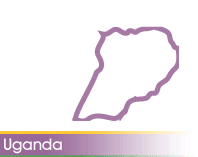 Uganda
Uganda

English version (PDF 61KB)
MDRP Uganda Activities at a Glance |
|
| Finances |
|
| Activities |
|
| Progress |
|
Table last updated August 2009
|
|
Background
In 1996-97 the Ugandan government began tacitly supporting rebel movements in the Democratic Republic of Congo (DRC) in the hope that these groups would prevent Ugandan rebel groups based in the DRC from launching attacks into Uganda. The Ugandan Peoples' Defense Forces (UPDF) then entered the DRC in 1998 to support further these Congolese rebel groups and further secure Uganda’s borders. The UPDF withdrew following the Lusaka Cease-fire Agreement of July 1999; later redeployed to the DRC’s Ituri district, and again withdrew in May 2003.
The Government of Uganda has also been fighting the Lord's Resistance Army (LRA) for about two decades. There have been a series of attempted solutions to the conflict. The government adopted the 2000 Amnesty Act granting amnesty to any combatant or collaborator who renounced rebellion. The International Criminal Court (ICC) investigated the LRA at the invitation of President Museveni and indicted five top LRA commanders in 2005. In mid-2006, the Government of Southern Sudan initiated mediation efforts that led to the signing of a cessation of hostilities agreement between the LRA and the Government of Uganda. In February 2008, the two parties initiated a comprehensive agreement during talks in Juba, Sudan, which has to date not yet been signed. A joint military operation ( Uganda, DRC and Southern Sudan) against the LRA in eastern DRC started in December 2008, without significant success to date.
No national program in Uganda. See theSpecial Project section below for further description of MDRP activites in Uganda.
Project:
Repatriation, Rehabilitation, Resettlement and Reintegration of 'Reporters' in Uganda
Administrator:Uganda Amnesty Commission
Financing:$4.2 million
Status:
Closed
Objective:
- Assist approximately 15,300 ex-combatants in their reintegration into civilian life, within the context of Uganda's Amnesty Act of 2000
- Strengthen the capacity of the Amnesty Commission
The largest part of the target group was composed of ex rebels and/or ex abductees from the Lord's Resistance Army (LRA). Other groups were ex-members of the Allied Democratic Forces (ADF), West Nile Bank Front (WNBF), FOBA/NOM, Uganda National Democratic Alliance Front (UDA/F) and the Uganda National Freedom Movement/Army (UNFM(A).
The project consisted of five components:
- Sensitization and dialogue – Sensitization efforts targeted the public and political leadership with messages on conflict resolution through reconciliation and promoted dialogue among the government and potential ex-combatants, ex-combatants and the community, and amongst ex-combatants themselves. The Amnesty Commission also sought to inform combatants of the possibility of amnesty.
- Demobilization and processing of Amnesty Applications – This component included disarmament and decommissioning of weapons (not financially supported by MDRP); identification, screening and documentation of ex-combatants; issuance of certificate of amnesty; and - in some cases - repatriation.
- Reinsertion (resettlement) support – The ex-combatants reported to reception centers, where the formal procedures for applying for amnesty took place, as well as other activities, such as the psycho-social and health status assessment of ex-combatants, and the provision of counseling and referral services. Ex-combatants registered and granted amnesty received their documentation and initial reinsertion assistance – in-kind and some cash.
- Longer-term social and economic reintegration – Social reintegration activities of the Amnesty Commission included direct counseling and the facilitation of reporters to find access to economic and educational opportunities or other support programs.
- Institutional strengthening of Amnesty Commission – This component included the recruitment and training of staff, installment of financial management system, and procurement of equipment.
Overall Results:
Final Progress Update:
- The MDRP Special Project in support of the Amnesty Commission formally closed June 30, 2007.
- The Project has assisted the Government in the reception and processing of 16,256 rebels who applied for amnesty.
- The project assisted in the distribution of 14,816 reinsertion packages to former rebels and their collaborators.
- The project assisted the Amnesty Commission to play a considerable role in sensitizing the population, including though the Emergency Humanitarian Action Plan.
Country Documents
The following documents will help better understand the country and its context.
Program Documentation:
n/a
Other Documents:
Opportunities and Constraints for the Disarmament &
Repatriation of Foreign Armed Groups in the
Democratic Republic of Congo
The cases of the: FDLR, FNL and ADF/NALU
English (PDF 3.97 MB) Français (PDF 4.14 MB)
The Status of LRA Reporters 1
MDRP Dissemination Note No. 2
February - March 2008
English (PDF 250 KB)
News:
Contacts
World Bank:
1 Lumumba Avenue
Rwenzori House, 4th Floor
Kampala
UGANDA
Kees Kingma
Email: [email protected]
Government Agency:
Amnesty CommissionP.O. Box 33956
Kampala
UGANDA
Mr. Damian Kato
Email: [email protected]
Relevant Links
These links will help you better understand the country and its context.
The World Bank: Uganda
allAfrica.com: Uganda
Amnesty International: Uganda
Human Rights Watch: Uganda
Institute for Security Studies: Uganda
Integrated Regional Information Networks (IRIN): Uganda
International Crisis Group: Uganda
ReliefWeb: Uganda
Website links provided on this website are for informational purposes only. Their inclusion does not imply MDRP endorsement of or responsibility for the information included therein.
